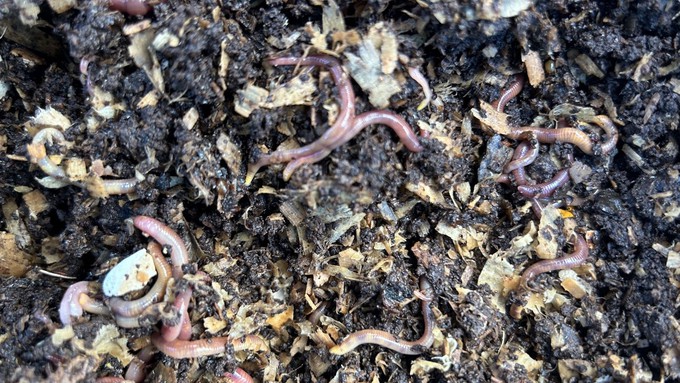
Master gardeners offer spring workshops in vermiculture

Red crawlers (not earthworms) live and eat well in a large bin filled with pine shavings. Kathy Morrison
Let's talk worms, shall we? Specifically, composting with worms.
This type of composting is easier, I believe, than starting and maintaining a classic compost bin. The worms and their kitchen-waste food are contained, as is the compost (castings) they produce. And those castings are so rich, so wonderful for the garden soil! It's sustainability at its finest. As a plus, it's a great activity for kids.
This spring, several UCCE master gardener groups in the region have scheduled classes in worm composting. Three types of classes are being offered, but the signup for the first and most detailed class -- one which comes with worms and supplies -- closes Monday, March 11, so move fast if you are interested.
The classes are:
-- Saturday, March 23, 10 a.m. to 12:30 p.m., UCCE office auditorium, 4145 Branch Center Road (off Bradshaw), Sacramento. The Sacramento County master gardeners will offer presentations on the care and feeding of worms, options for harvesting castings, and a question-and-answer period. Each participant will receive education materials, a worm bin with bedding, red wiggler worms and adoption papers. Cost is $30; ages 13 and up only. Register here by March 11. No drop-ins; no refunds. Information: https://sacmg.ucanr.edu/?calitem=574965
-- Thursday, March 14, and Thursday, March 28, 3 to 4 p.m., online via Zoom. These paired classes from the Yolo County master gardeners are part of their semi-monthly gardening workshops. Both classes are free and do not require registration; gardeners can take either or both. The March 14 workshop with master gardener Jennifer Gilbert will be on "backyard composting," including worm composting. The Zoom link for this class is https://yolocounty.zoom.us/j/89236348462. In the March 28 class, master gardener Janet Gaard plans to lead a lively discussion about worm castings, compost and fertilizers -- and when plants don't need fertilizing. The Zoom link is https://yolocounty.zoom.us/j/87053297221 For more information on Yolo master gardeners events, go to https://yolomg.ucanr.edu/Public_Education/
-- Thursday, June 20, 6 to 7 p.m., Vacaville Library, 1020 Ulatis Drive, Vacaville. This is a free, in-person class offered by the Solano County master gardeners, taught by Jennifer Baumbach. The master gardeners note: "Bring a shoebox and take home your starter worm composting bin. You must RSVP that you'll participate in the shoebox activity to rehabnurse@sbcglobal.net so she'll have enough worms for everyone." For all the spring events planned by the Solano master gardeners, go to https://solanomg.ucanr.edu/?calendar=yes&g=101656
A personal comment on the shoebox, from a worm "mom" of four years: The worms won't be staying in a shoebox. My worm colony started with two dozen wigglers that eventually grew to fill a large, heavy-duty tote. I've moved some worms into the garden, both accidentally and intentionally, but the main group still hangs out in the bin. They are terrific garden "pets."
Comments
0 comments have been posted.Sacramento Digs Gardening to your inbox.
Food in My Back Yard Series
April 1: Don't be fooled by these garden myths
March 25: Fertilizer tips: How to 'feed' your vegetables for healthy growth
March 18: Time to give vegetable seedlings some more space
March 11: Ways to win the fight against weeds
March 4: Potatoes from the garden
Feb. 25: Plant a fruit tree now -- for later
Feb. 18: How to squeeze more food into less space
Feb. 11: When to plant? Consider staggering your transplants
Feb. 4: Starting in seed starting
Sites We Like
Garden Checklist for week of March 30
Your garden doesn’t mind April showers. Get busy now to enjoy those future flowers.
* Get ready to swing into action in the vegetable garden. As nights warm up over 50 degrees, start setting out tomato, pepper and eggplant transplants.
* From seed, plant beans, beets, cantaloupes, carrots, corn, cucumbers, melons, pumpkins, radishes and squash. (Soak beet seeds overnight in water for better germination,)
* Plant onion sets.
* In the flower garden, plant seeds for asters, cosmos, celosia, marigolds, salvia, sunflowers and zinnias.
* Transplant petunias, zinnias, geraniums and other summer bloomers.
* Plant perennials and dahlia tubers for summer bloom.
* Transplant lettuce and cabbage seedlings.
* April is the last chance to plant citrus trees such as dwarf orange, lemon and kumquat. These trees also look good in landscaping and provide fresh fruit in winter.
* Smell orange blossoms? Feed citrus trees with a low dose of balanced fertilizer (such as 10-10-10) during bloom to help set fruit. Keep an eye out for ants.
* Apply slow-release fertilizer to the lawn.